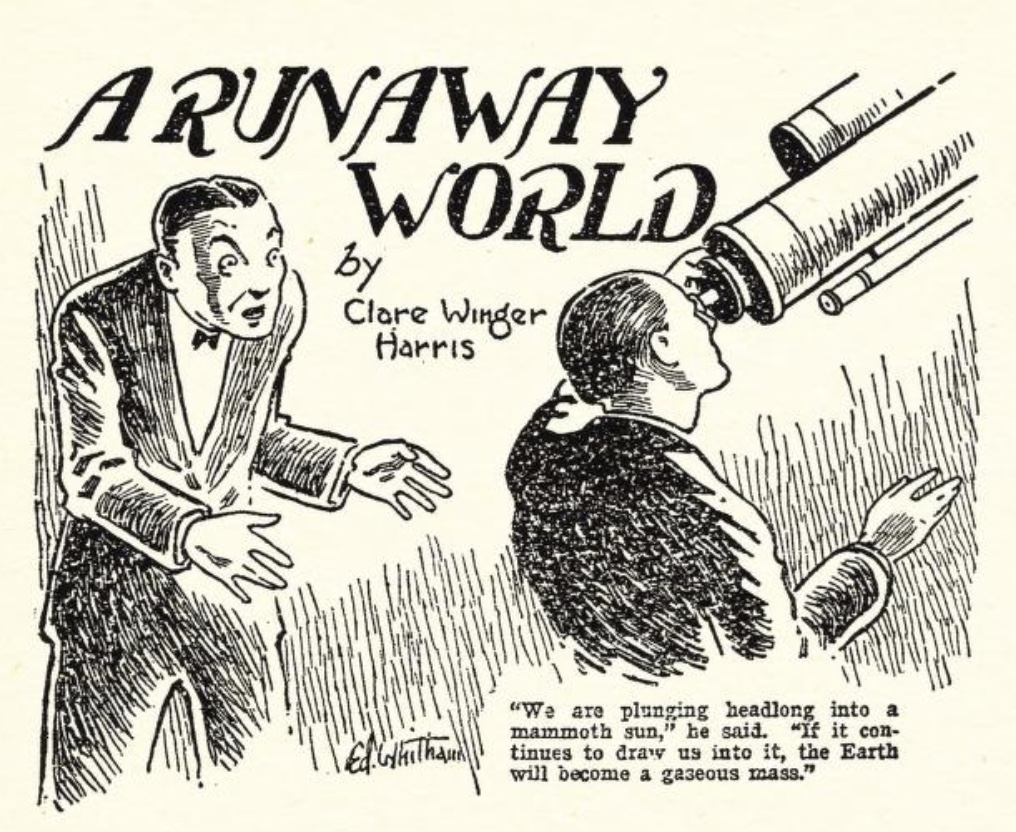A RUNAWAY WORLD (5)
By:
December 5, 2022

HiLoBooks is pleased to serialize “A Runaway World,” by Clare Winger Harris. This story, her first, appeared in the July 1926 issue of Weird Tales; it entered the public domain in 2022.
ALL INSTALLMENTS: 1 | 2 | 3 | 4 | 5 | 6 | 7 | 8.
The grassy knoll upon which this edifice stood had an elevation of about twenty feet and the building itself was not less than forty feet high, so that an observer at the telescope had an unobstructed view of the heavens. The lower floor was equipped as a chemical laboratory, and in its two large rooms college classes had met during the school term in chemistry and astronomy. The second story, I thought, could be used as sleeping quarters for the nine souls who felt certain the observatory would eventually be their mausoleum.
“All in?” I shouted as I ran into the building and slammed the door behind me. How welcome was the warmth that enveloped me!
“Yes, we’re all in, and I suspect you are, too, judging from appearances,” laughed Vera.
“I looked from one to another of the little group and somehow I felt that though each tried to smile bravely, grim tragedy was stalking in our midst.
Late in the afternoon I thought of our radio and televisio, and decided to run over to the house and get them. The streets were deserted and covered with several inches of snow, and the cold was intenser than I had ever experienced. A few yards from the observatory lay a dark object. I investigated and found it to be a dog frozen as stiff as though carved from wood, and that in a few hours! My lungs were aching now as I looked across the street at our home, and though wanted the instruments badly I valued life more highly. I turned and retraced my steps to the observatory.
The men were disappointed that we were to be so cut off from communication with the outside world, but the essentials of life were of primary importance. We swallowed our disappointment then and many times in the future when from time to time we missed the luxuries of modern lfte to which we had been accustomed.
Later, while the children were being put to bed, we men ascended the steps to the telescope room where we gazed ruefully at the diminishing disk of the luminary that had given life to this old Earth of ours for millions of years.
“I suppose that’s the way old Sol looked to the Martians before the days of our system’s disruption,” commented Ed with a side glance in my direction.
“The inhabitants of Mars saw a larger orb in their heavens than that,” replied Oscar, adjusting the instrument. “We are well beyond the confines of our solar system. What do you see there, boys!”
We looked alternately through the eyepiece and beheld a bright star slightly smaller than our once glorious sun now appeared to be.
“That is Neptune,” explained Marden, “the outermost planet of the
system.”
“So we are entering the unknown! Whither are we bound, Marden?” I cried, suddenly overwhelmed with the awfulness of it all.
The young astronomer shrugged his shoulders. “I do not know. But we shall not be the only dead world hurtling through space! The void is full of them. I think it was Tennyson who wrote—”
“Never mind Tennyson!” I fairly shrieked. “Tell me, do yon think this is the — the end?”
He nodded thoughtfully and then repeated: “Lord Tennyson wrote, ‘Many a planet by many a sun may roll with the dust of a vanished race’.”
“Say, this is as cheerful as a funeral service,” said Zutell. “I’m going down with the women. I can hear them laughing together. They’ve got more grit and pluck than we have. You two old pessimists can go on with your calamity-howling. I’m going to get a few smiles yet before I look like a piece of refrigerator meat.”
“Ed’s right for once,” I laughed. “We can’t help matters this way.”
RADIUM AGE PROTO-SF: “Radium Age” is Josh Glenn’s name for the nascent sf genre’s c. 1900–1935 era, a period which saw the discovery of radioactivity, i.e., the revelation that matter itself is constantly in movement — a fitting metaphor for the first decades of the 20th century, during which old scientific, religious, political, and social certainties were shattered. More info here.
SERIALIZED BY HILOBOOKS: James Parker’s Cocky the Fox | Annalee Newitz’s “The Great Oxygen Race” | Matthew Battles’s “Imago” | & many more original and reissued novels and stories.
